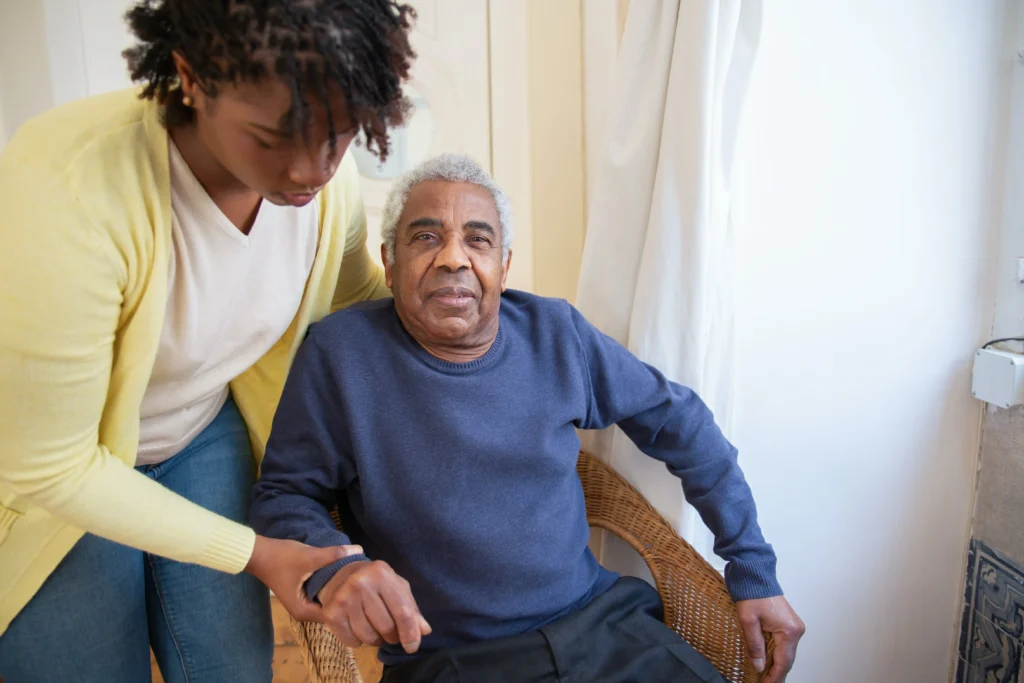How to Initiate End of Life Conversations with Seniors

- Introduction to End of Life Conversations
- What is End of Life Care?
- The Importance of Approaching End of Life Conversations with Love and Understanding
- Understanding the Emotional and Psychological Aspects of End of Life Planning
- How to Initiate End of Life Conversations with Seniors
- The Role of Healthcare Professionals in End of Life Conversations
- The Impact of End of Life Conversations on Family Dynamics
- Conclusion: The Power of Connection in End of Life Conversations
- Frequently Asked Questions (FAQs)
Introduction to End of Life Conversations
This post may contain affiliate links, meaning I may earn a commission if you make a purchase, at no extra cost to you. I only recommend products I trust. Thank you for your support.
End-of-life care is a topic that many people feel uncomfortable discussing, but it is an essential part of ensuring that our loved ones are supported and their wishes are respected during their final stages of life.
What is End of Life Care?

End of life care refers to the medical and emotional support provided to individuals who are nearing the end of their lives. Some times, it is referred to as palliative care. It involves discussions about treatment options, pain management, and decisions regarding life-sustaining interventions. These conversations can be difficult, but they are crucial for ensuring that the individual’s needs and desires are met.
The Importance of Approaching End of Life Conversations with Love and Understanding
Approaching end of life conversations with love and understanding is crucial for several reasons. Firstly, it allows seniors to express their wishes and desires, ensuring that their preferences are respected and honored. This approach also helps to alleviate any fears or anxieties they may have about the end of life process.
Understanding the emotional and psychological aspects of end of life planning is essential for approaching these conversations with sensitivity. Some key points to consider include:
- Acknowledging and validating the emotions experienced by seniors, such as fear, sadness, or even relief.
- Recognizing that everyone’s experience with end of life planning is unique and respecting individual choices.
- Being patient and allowing seniors to express their thoughts and concerns at their own pace.
- Offering emotional support and reassurance throughout the process.
Here are some key points to consider when approaching end-of-life conversations with seniors:
- Active listening: Take the time to truly listen to your loved one’s fears, hopes, and concerns. By actively listening, you show them that their thoughts and feelings are valued.
- Empathy: Put yourself in their shoes and try to understand their perspective. This will help you respond with compassion and kindness.
- Openness: Create an atmosphere of openness and honesty. Encourage your loved one to express their wishes and concerns without fear of judgment.
- Respect: Respect their autonomy and individuality. Recognize that everyone’s end of life journey is unique, and their wishes may differ from your own.
- Patience: Be patient and understanding. Some conversations may be emotional and difficult, so allow your loved one the time and space they need to express themselves.
By approaching these conversations with empathy and compassion, we create a safe and trusting environment that encourages open and honest communication. This enables seniors to share their thoughts, concerns, and hopes, fostering a deeper connection between them and their loved ones. Ultimately, it helps to create a sense of peace and comfort during this challenging time.
Understanding the Emotional and Psychological Aspects of End of Life Planning
End of life planning can bring up a range of emotions for both the individual and their loved ones. It is important to recognize and address these emotional and psychological aspects to ensure that everyone involved feels supported and understood.
- Fear and Anxiety: Many individuals experience fear and anxiety when discussing end-of-life planning. They may be afraid of the unknown, of experiencing pain or discomfort, or of being a burden to their loved ones. Acknowledge these fears and reassure them that their needs will be met.
- Grief and Loss: End-of-life conversations can also bring up feelings of grief and loss. It is natural to mourn the future that will not be realized and to feel sadness about saying goodbye. Allow space for these emotions and offer support and comfort.
- Regret and Guilt: Some individuals may express regret or guilt about decisions they made earlier in life. It is important to listen without judgment and validate their feelings. Remind them that they made the best decisions they could with the information they had at the time.
- Finding Meaning: End-of-life planning can also be an opportunity for individuals to find meaning and purpose in their lives. Encourage discussions about their legacy, the values they hold dear, and the impact they have made on others.
- Spiritual and Cultural Considerations: It is important to respect and address any spiritual or cultural beliefs that may influence end-of-life planning. These beliefs can provide comfort and guidance during this time.
How to Initiate End of Life Conversations with Seniors
Initiating end of life conversations with seniors can be challenging, but it is essential for ensuring their wishes are known and respected. Here are some strategies to help you approach these conversations:
Building Trust and Creating a Safe Space for Conversations
Building trust is crucial for creating a safe space for end-of-life conversations. Start by having open and honest discussions about your own feelings and fears regarding end of life care. This vulnerability can encourage your loved one to open up as well. Make it clear that you are there to support them and that their wishes will be respected.
Exploring and Respecting Individual Preferences for End of Life Care
Each individual’s preferences for end of life care can vary significantly. It’s crucial to explore and respect these preferences when initiating conversations. Ask open-ended questions that allow seniors to express their desires and concerns. Examples include:
- What are your thoughts on medical treatments at this stage of your life?
- Have you considered any specific type of care or support that you would like to receive?
- Are there any cultural or religious beliefs that influence your end of life decisions?
By actively listening and respecting their preferences, you can approach these conversations with the love and understanding that seniors need.
Providing Support and Resources for End of Life Planning

There are various resources available to support end of life planning. Here are five valuable resources to consider:
- Advance Care Planning: Advance care planning involves documenting an individual’s wishes for medical treatment and care. This can include a living will, which outlines their preferences for life-sustaining interventions, and a healthcare proxy, who will make decisions on their behalf if they are unable to do so.
- Hospice Care: Hospice care provides medical, emotional, and spiritual support to individuals in the final stages of life. They focus on pain management and improving quality of life. Hospice care can be provided at home or in a hospice facility.
- Palliative Care: Palliative care focuses on providing relief from symptoms and improving the quality of life for individuals with serious illnesses. It can be provided alongside curative treatments and is not limited to end-of-life care.
- Support Groups: Support groups can provide a space for individuals and their loved ones to share their experiences, fears, and hopes. They offer emotional support and can help individuals feel less alone during this challenging time. Here are some of the support groups specifically focused on end of life care:
- Hospice Foundation of America – Bereavement Support: Offers support for individuals coping with grief and loss, especially those who have experienced the death of a loved one in hospice care.
- The Conversation Project: A support group emphasizing open and honest discussions about end-of-life wishes, helping individuals navigate challenging conversations with their loved ones.
- Compassion & Choices: End-of-Life Planning Support: Offers resources and support for individuals considering end-of-life options and advocating for their own healthcare choices.
- Growth House End-of-Life Support: A supportive community for individuals dealing with end-of-life issues, offering information, forums, and resources for caregivers and those facing terminal illnesses.
- Grief Counseling: Grief counseling can provide support and guidance for individuals and families who are mourning the loss of a loved one. It can help navigate the complex emotions that arise during the grieving process.
By providing information and access to these resources, you can empower your loved one to make informed decisions and ensure their end of life wishes are honored.
The Role of Healthcare Professionals in End of Life Conversations
Healthcare professionals play a vital role in end of life conversations. They are trained to provide medical guidance and support, as well as address the emotional and psychological needs of patients and their families. Here are some key roles healthcare professionals play in end of life conversations:
- Facilitating Discussions: Healthcare professionals can initiate and guide end-of-life conversations with patients and their families. They can provide information about treatment options, prognosis, and palliative care, and help individuals make informed decisions.
- Providing Emotional Support: End-of-life conversations can be emotionally charged. Healthcare professionals are trained to offer empathy and support during these discussions. They can validate emotions, answer questions, and provide comfort.
- Coordinating Care: Healthcare professionals can help coordinate care between various providers, ensuring that the individual’s needs and wishes are met. They can also advocate for the patient’s preferences and ensure their voice is heard.
- Educating and Empowering: Healthcare professionals can educate patients and their families about the available resources and support services. They can empower them to make informed decisions and navigate the complexities of end-of-life care.
- Offering Bereavement Support: After the loss of a loved one, healthcare professionals can provide bereavement support. This can include counseling, support groups, and resources to help individuals and families navigate the grieving process.
The Impact of End of Life Conversations on Family Dynamics
End of life conversations can have a significant impact on family dynamics. These discussions can bring families closer together, but they can also create tension and conflict. Here are some ways end of life conversations can impact family dynamics:
- Strengthening Family Bonds: Engaging in end of life conversations can bring families closer together. By openly discussing wishes and concerns, families can develop a deeper understanding of each other’s values and desires.
- Resolving Conflicts: End of life conversations may uncover disagreements or conflicts within families. However, addressing these conflicts in a respectful and understanding manner can lead to resolution and healing.
- Providing Closure: End of life conversations allow family members to express their love, gratitude, and forgiveness to their senior loved ones. This provides a sense of closure and peace, benefiting both the seniors and their families.
- Preparing for Grief and Loss: Engaging in end of life conversations helps families prepare for the eventual loss of their loved one. It provides an opportunity to express emotions, share memories, and support each other during this challenging time.
By understanding and addressing the impact of end of life conversations on family dynamics, we can navigate these conversations with love and understanding, fostering stronger relationships and emotional well-being.
As a caregiver, attending to the needs of your loved one can be both rewarding and demanding. Recognizing the importance of self-care, respite care becomes a valuable resource.
Taking periodic breaks through respite care allows you the opportunity to recharge, rejuvenate, and ensure you can continue providing the best possible care for your loved one with renewed energy and dedication.
Explore these articles about caregiver coping strategies that address burnout and senior activities that boost happiness.
Conclusion: The Power of Connection in End of Life Conversations
End of life conversations are a powerful way to connect with seniors, providing them with the love and understanding they need during their final stages of life.
Approaching these conversations with empathy, respect, and open-mindedness can create a safe and trusting environment where seniors can express their wishes and concerns.
By building trust, exploring individual preferences, and providing support and resources, we can ensure that seniors receive the care and comfort they deserve.
Healthcare professionals play a vital role in guiding individuals and their families through this process, while end of life conversations can have a profound impact on family dynamics, strengthening bonds and providing closure.
In the end, it is the power of connection that brings comfort and peace to seniors and their loved ones during this challenging journey. Let us approach end of life conversations with love and understanding, cherishing the opportunity to create meaningful connections in our final moments together.

If you are in need of someone to talk to, feel free to contact me here.
Learn more about PDA in Autism, Intracranial Pressure (ICP), respite care for caregivers, comfort care or palliative care, hospice care, caring for patient with alzheimer and dementia, COPD, spastic quadriplegia cerebral palsy, and caring for stroke patients.
Frequently Asked Questions (FAQs)
What is End of Life Care?
End of life care refers to the medical and emotional support provided to individuals who are nearing the end of their lives.
Why are end of life conversations important?
End of life conversations are important because they allow individuals to express their wishes, ensure their needs are met, and provide support during their final stages of life. These conversations also help ease anxiety and fear, promote open communication, and strengthen relationships.
How can I approach end-of-life conversations with my loved ones?
Approach end of life conversations with empathy, active listening, and respect. Create a safe and supportive environment, allowing your loved one to express their wishes, concerns, and fears. Be patient, understanding, and non-judgmental.
What resources are available for end of life planning?
There are several resources available for end of life planning, including advance care planning documents, hospice care, palliative care, support groups, and grief counseling. These resources can provide guidance, support, and comfort during this challenging time.
What role do healthcare professionals play in end-of-life conversations?
Healthcare professionals play a crucial role in facilitating end of life conversations, providing medical guidance, emotional support, and coordinating care. They can educate and empower individuals and families, ensuring their needs and wishes are met.
What should your goals in end of life care include?
The primary goals in end of life care are to ensure comfort, maintain dignity, and enhance quality of life for individuals facing terminal illnesses. This involves managing pain, addressing emotional and spiritual needs, and facilitating open communication to honor the patient’s wishes.
Note: This article is for informational purposes only and should not be taken as medical or legal advice. It is always recommended to consult with healthcare professionals and legal experts for specific situations.




